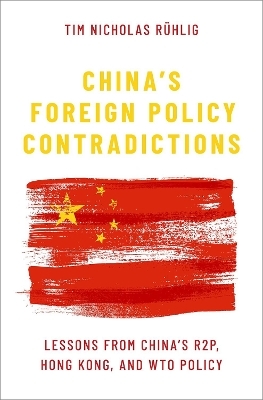
China's Foreign Policy Contradictions
Oxford University Press Inc (Verlag)
978-0-19-757330-3 (ISBN)
To explain these contradictions, Rühlig draws from a rich battery of in-depth interviews with party-state officials to explain the foreign policy dynamics and processes of the normally opaque Chinese party-state. He demonstrates how different sources of the Chinese Communist Party's domestic legitimacy compete within the complex and highly fragmented Chinese party-state, resulting in contradictory foreign policies. He focuses on three issue areas: international human rights law and "responsibility to protect" (R2P); China's role in World Trade Organization (WTO) policymaking; and China's evolving relationship with Hong Kong. In each area, different factions within the party-state wrestle for control, with domestic legitimacy of the party always being the overriding goal. This incessant competition within the state's institutions often makes the PRC's foreign policy contradictory, undermining its ability to project and promote a "China Model" as an alternative to the existing international order (and more specifically as a champion of nonintervention). Instead, it often pursues narrowly nationalistic interests.
By elucidating how foreign policymakers strategize and react within the context of a massive and complex bureaucratic system that is constantly under pressure from many sides, Rühlig shows not only why China's foreign policy is so inconsistent, but why it is likely to contribute to a more particularistic, plural, and fragmented international order in the years to come. This book represents a significant advance in our understanding of the foreign policymaking process in authoritarian regimes.
Tim Nicholas Rühlig is a research fellow at the German Council on Foreign Relations and an associate fellow with The Swedish Institute of International Affairs analyzing Europe-China relations and Chinese foreign and industrial policy—including high technology and Hong Kong politics. His current projects focus on China's domestic determinants of Chinese foreign policymaking, China's growing footprint in technical standardization, the emerging US-China technology rivalry and its implications for Europe. In addition to his academic research, Rühlig provides policy advice to European policymakers such as the European Commission. He chairs the working group "high technology and innovation" of the EU-funded COST Action "Europe in China Research Network" (CHERN) and is a member of the European Think-tank Network on China (ETNC), which he coordinated in 2018.
I. Introduction
I.1 Why bother about Chinese foreign policy contradictions?
I.2 Rule monopolist vs. rule manager: China and the transformation of the state
I.3 Towards an anthropology of China's foreign policymaking
I.4 The four main contributions of this book
I.5 Outline of the book
II. Unpacking the Chinese party-state
II. 1 State image and state transformation in "New China"
II.1.1 China's party-state as a rule monopolist
II.1.2 China's party-state as a rule manager
II.2 The contested approach to the role of the state and China's contradictory foreign policy
III. Chinese approaches to international security: the Responsibility to Protect
III.1 China's contradictory R2P policy
III.1.1 China's approach to the R2P in Libya
III.1.2 China's approach to the R2P in Syria
III. 2 Understanding China's contradictory R2P policy
III.2.1 The implications of trade-offs in the CCP's legitimization for China's R2P policy
III.2.2 China's R2P policy: decision-making and institutions
III.3 Implications of China's contradictory R2P policy for the international order
III.4 Summary of findings
IV. Chinese approaches to rule: One Country, Two Systems in Hong Kong
IV.1 China's contradictory Hong Kong policy
IV.1.1 China's approach to national security under article 23 of the Basic Law
IV.1.2 China's approach to electoral reform under article 45 of the Basic Law
IV.2 Understanding China's contradictory Hong Kong policy
IV.2.1 The implications of trade-offs in the CCP's legitimization for China's Hong Kong policy
IV.2.2 The implications of the party-state's structure for China's Hong Kong policy
IV.3 Implications of China's contradictory Hong Kong policy for the international order
IV.4 Summary of findings
V. Chinese approaches to welfare: the implementation of WTO law
V.1 China's contradictory WTO policy
V.1.1 China's approach to the DSB
V.1.2 China's approach to WTO law in the banking sector
V.2 Understanding China's contradictory WTO policy
V.2.1 The implications of trade-offs in the CCP's legitimization for China's WTO policy
V.2.2 The implications of the party-state's structure for China's WTO policy
V.3 Implications of China's contradictory WTO policy for the international order
V.4 Summary of findings
VI. Conclusions
VI.1 China's foreign policy contradictions and the future international order
VI.2 Contributions to existing research
VI.3 Implications for policymakers and practitioners
References
Notes
| Erscheinungsdatum | 21.01.2022 |
|---|---|
| Verlagsort | New York |
| Sprache | englisch |
| Maße | 251 x 165 mm |
| Gewicht | 544 g |
| Themenwelt | Sozialwissenschaften ► Politik / Verwaltung ► Europäische / Internationale Politik |
| Sozialwissenschaften ► Politik / Verwaltung ► Politische Theorie | |
| ISBN-10 | 0-19-757330-4 / 0197573304 |
| ISBN-13 | 978-0-19-757330-3 / 9780197573303 |
| Zustand | Neuware |
| Haben Sie eine Frage zum Produkt? |
aus dem Bereich


